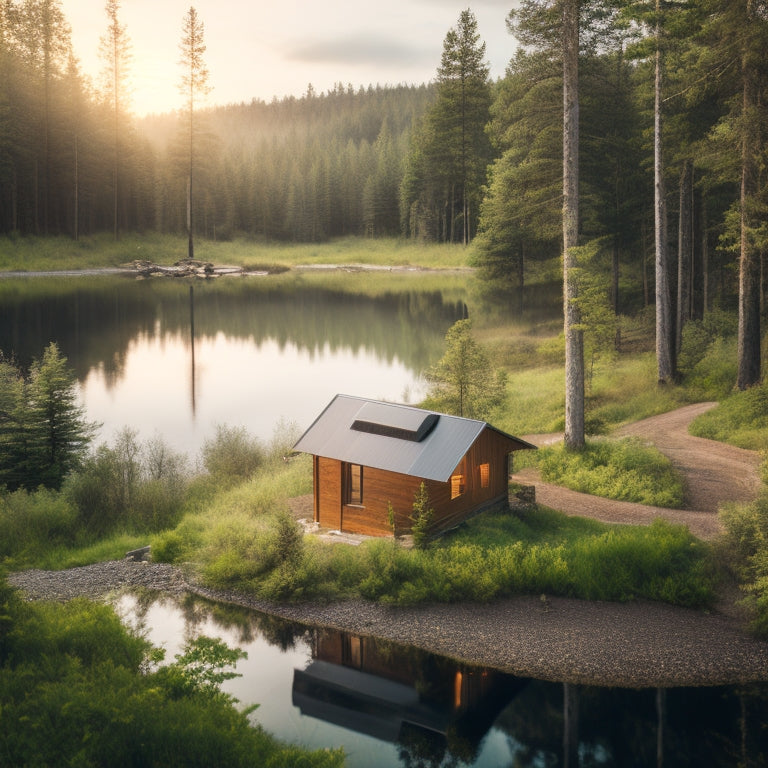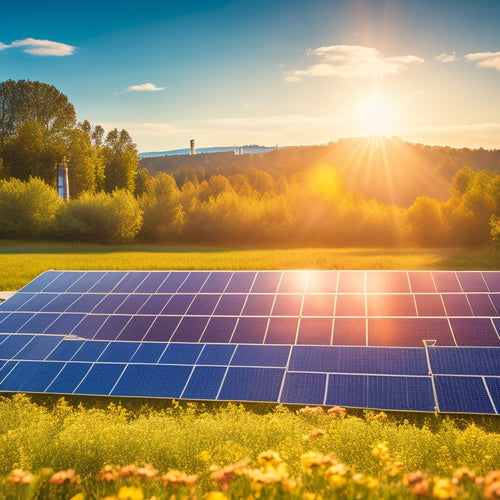
Solar for Off Grid Cabin
Share
You're opting for an off-grid cabin, which means you're choosing to disconnect from utility companies and adopt a self-sufficient lifestyle, relying on renewable energy sources like solar power to meet your energy demands. To achieve this, you'll want to prioritize energy independence, maximizing your energy harvesting through efficient techniques like Maximum Power Point Tracking and high-energy conversion rate solar panels. Evaluating your energy demands accurately will also help you optimize your system and reduce costs. By doing so, you'll be well on your way to enjoying the freedom and environmental benefits that come with off-grid living - and there's more to investigate to guarantee a seamless changeover.
The Essentials
- Off-grid solar systems provide energy independence, eliminating reliance on utility companies and enabling a self-sufficient lifestyle.
- Solar power is a clean, quiet, and renewable energy source that reduces carbon footprint and energy costs, fostering confidence in living off the grid.
- Optimizing energy efficiency minimizes reliance on solar energy storage and lowers monthly energy costs by reducing power consumption through efficient appliances and smart home devices.
- Solar storage systems store excess energy for nighttime or low sunlight use, and proper energy storage sizing ensures power availability when needed.
- Assessing energy demands involves calculating daily power requirements based on appliance wattage to prevent undersized or oversized systems and prioritize energy management.
Zero Reliance on Utilities
You're looking to break free from the grid and enjoy energy independence now.
With a solar-powered off-grid cabin, you'll have a renewable power source that's clean, quiet, and reliable. By utilizing the sun's energy, you'll be able to generate your own electricity, reducing your reliance on utilities to zero.
Traditional generators can be noisy, polluting, and requiring frequent refueling, but off-grid solar kits offer a cost-effective and low-maintenance alternative, reducing your environmental footprint.
Energy Independence Now
As you initiate the design of your off-grid cabin's energy system, attaining energy independence becomes a top priority, allowing you to sever ties with utility companies and rely solely on renewable energy sources. This means you'll need a reliable system that can provide power consistently, even during periods of low sunlight or extreme weather conditions.
When evaluating an 'Off Grid Solar Power System', many shoppers are enthusiastic to break free from the constraints of traditional grid-based energy and utilize the power of the sun for their homes or businesses renewable energy solutions.
To achieve energy independence, you'll want to evaluate a hybrid system that combines solar power with backup generators and solar storage. This will provide a reliable source of power when the sun isn't shining. Your solar storage system should be designed to store excess energy generated during the day for use at night or during periods of low sunlight.
Additionally, a backup generator can provide power during extended periods of low energy production. With a well-designed hybrid system, you'll attain true energy independence, freeing yourself from reliance on utility companies and their fluctuating rates.
You'll have the freedom to live off the grid, without sacrificing comfort or convenience. By combining solar power, solar storage, and backup generators, you'll be able to enjoy a self-sufficient lifestyle, free from the constraints of traditional energy sources.
Renewable Power Source
Your off-grid cabin's energy system relies on a renewable power source, allowing you to eliminate your reliance on utility companies. This means you're not tied to the grid, and you can enjoy the freedom that comes with it.
With solar technology, you can utilize the sun's energy to power your cabin, reducing your carbon footprint and energy costs. By embracing renewable energy with self-sufficient power solutions Off Grid Solar, you can navigate the obstacles of traditional grid power and achieve energy independence.
As a renewable power source, solar energy is sustainable, clean, and abundant. You can install solar panels on your cabin's roof or in a nearby area, depending on the available space and sunlight. The panels will convert sunlight into electrical energy, which is then stored in batteries for later use. This setup guarantees a consistent and reliable power supply, even on cloudy days or during the night.
The off-grid benefits are numerous. You'll have no electricity bills, no power outages, and no reliance on utility companies. You'll also reduce your environmental impact, as solar energy is a clean and renewable source of power.
With a renewable power source, you can live off the grid with confidence, enjoying the freedom and independence that comes with it.
Lower Monthly Energy Costs
You'll want to optimize your off-grid cabin's energy efficiency by implementing systems that reduce power consumption, thereby minimizing your reliance on solar energy storage.
This can be achieved through the installation of energy-efficient appliances, LED lighting, and smart home devices that help you monitor and control your energy usage.
When selecting energy storage solutions, consider long-lasting battery solutions that can provide a reliable backup power source.
Energy Efficiency Systems
At least 30% of a typical off-grid cabin's energy consumption stems from inefficient appliances and lighting. This unnecessary energy waste can be greatly reduced by implementing energy efficiency systems. By doing so, you'll not only lower your monthly energy costs but also increase your energy independence.
To achieve ideal energy efficiency, consider the following key components:
| Component | Description | Benefits |
|---|---|---|
| Energy Storage | Correctly sizing your energy storage system guarantees you have power when you need it. | Reduces energy waste, increases efficiency |
| Battery Management | A well-designed battery management system prolongs battery life and prevents damage. | Increases system lifespan, reduces maintenance |
| Inverter Selection | Choosing the right inverter guarantees efficient energy conversion and minimizes losses. | Increases energy output, reduces heat generation |
| Load Balancing | Proper load balancing distributes energy evenly, reducing strain on your system. | Increases system efficiency, reduces wear and tear |
| System Maintenance | Regular maintenance guarantees your system operates at peak performance. | Increases energy output, reduces downtime |
Reduce Power Consumption
With energy efficiency systems in place, the next step towards achieving energy independence is to reduce power consumption, which directly translates to lower monthly energy costs.
You can achieve this by adopting energy-saving habits and incorporating smart appliances into your off-grid cabin. Start by identifying areas where you can cut back on energy usage, such as using LED bulbs, turning off lights and electronics when not in use, and adjusting your thermostat.
Invest in smart appliances that are designed to optimize energy efficiency, such as energy-efficient refrigerators and washing machines. Additionally, consider installing low-flow showerheads and toilets to reduce water consumption.
Maximum Power Point Tracking
When you're designing an off-grid solar system, maximizing energy harvesting is essential.
You'll want to guarantee your system operates at its best performance, and that's where Maximum Power Point Tracking (MPPT) comes in. By implementing MPPT, you'll be able to efficiently harvest energy from your solar panels, particularly in systems featuring deep cycle batteries and power storage units.
This is especially important in remote homes where renewable energy independence is paramount. You'll be able to efficiently harvest energy from your solar panels and enhance your system's overall performance.
Efficient Energy Harvesting
Since your off-grid cabin relies on solar power, maximizing energy harvesting is vital. To achieve this, you need to guarantee efficient energy harvesting through ideal solar panel placement, which involves considering factors like shading, tilt, and orientation. This will enable you to generate the most power possible from your solar array.
In addition to ideal panel placement, you'll need to select the right battery storage solutions and solar inverter types to match your energy needs. An energy audit can help you identify areas of inefficiency and provide benefits like reduced energy consumption and lower costs.
Weather impact analysis is also essential to guarantee your system can withstand harsh weather conditions. When integrating your off-grid system, consider load management strategies to enhance energy use and reduce waste.
You'll also want to investigate solar financing options to make your system more affordable. Regular maintenance is key to guaranteeing your system runs efficiently, so develop a maintenance schedule and follow best practices.
Optimized System Performance
You'll want to guarantee your solar panel system operates at its peak performance to maximize energy harvesting, which is where optimized system performance comes in. This is vital for off-grid cabins, where energy independence is key. Maximum Power Point Tracking (MPPT) is a technique used to optimize system performance by ensuring the solar panel system operates at its maximum power point. This is achieved through advanced algorithms that continuously monitor the system's performance and adjust the operating voltage to maximize energy production.
| MPPT Benefits | System Performance |
|---|---|
| Increased Energy Harvesting | 10-30% more energy production |
| Improved System Efficiency | 95-98% efficient energy conversion |
| Enhanced Performance Monitoring | Real-time system monitoring and diagnostics |
| Extended System Lifespan | Reduced wear and tear on system components |
Assess Your Energy Demands
You need to understand your energy usage patterns to determine how much power your off-grid cabin requires. To do this, calculate your daily power requirements by identifying the appliances and devices you'll be using and their respective wattage ratings.
When selecting a solar battery, consider options like Renogy deep cycle solar batteries that are designed for off-grid energy storage and can provide reliable power. Additionally, look for batteries with a long lifespan, such as lithium-ion batteries, to minimize replacements.
Energy Usage Patterns
About 90% of your off-grid cabin's energy expenses stem from a handful of indispensable appliances and systems. Understanding your energy habits and consumption trends is vital for determining the right solar power system for your needs.
To get started, take an inventory of your appliances and systems, noting their power ratings and usage patterns. You'll want to take into account factors like:
| Appliance/System | Average Daily Usage (hours) |
|---|---|
| Refrigerator | 24 |
| Lighting | 4-6 |
| Water Pump | 2-4 |
| Computer/Internet | 4-6 |
| Space Heating/Cooling | 2-6 |
Daily Power Requirements
With your appliance inventory in hand, it's time to crunch some numbers. Now, you'll determine your daily power requirements, a vital step in sizing your off-grid solar system.
Start by calculating the total daily watt-hours (Wh) required to power each appliance. Multiply the appliance's wattage by the number of hours it'll be used daily. For example, a 10W LED light used for 8 hours a day would require 80Wh.
Add up the total daily Wh for all appliances to determine your overall energy demand. This will give you your daily power requirement in Wh.
To convert this to ampere-hours (Ah), divide the total Wh by the system voltage (usually 12V or 24V). This will help you ascertain the required energy storage capacity for your battery bank.
Accurate power calculations are essential to guarantee your off-grid solar system can meet your energy needs. Underestimating your energy demands can lead to undersized systems, while overestimating can result in wasted resources.
Higher Energy Conversion Rate
You'll want to maximize your off-grid cabin's energy production by selecting solar panels with high energy conversion rates.
Efficient panel technology is key to achieving this goal, as it enables you to generate more power per hour of sunlight.
Look for panels with high efficiency ratings, typically above 20%, to get the most out of your solar setup.
Efficient Panel Technology
High-efficiency solar panels boasting higher energy conversion rates have become a breakthrough for off-grid cabin dwellers. You now have access to more energy from the same surface area, reducing the overall system size and cost.
These solar panel advancements are made possible by innovative materials and designs that minimize energy losses. For instance, bifacial panels can capture energy from both the front and back sides, increasing energy output by up to 25%.
Similarly, PERC (Passivated Emitter and Rear Cell) technology enhances energy conversion rates by reducing recombination losses. You can also opt for half-cut cell panels, which feature smaller cells that reduce electrical losses and increase overall efficiency.
Frequently Asked Questions
Can I Install a Solar System Myself or Do I Need a Professional?
You can attempt a DIY installation, but consider the safety implications; without proper training, you may compromise your system's efficiency and put yourself at risk, so weigh the freedom of self-installation against the importance of professional skill.
How Do I Maintain and Clean My Solar Panels for Optimal Performance?
Rev up your solar game like a Renaissance-era alchemist perfecting the philosopher's stone! You'll enhance panel efficiency by 15-20% by adopting regular cleaning techniques, like soft-bristled brushes and distilled water, to banish dust and debris from your system's surface.
Are Solar Panels Affected by Extreme Weather Conditions Like Hail?
You're right to wonder if solar panels can withstand extreme weather; they're designed to be hail-resistant and boast impressive weather durability, so you can rest assured they'll keep generating power even in harsh conditions.
Can I Add More Solar Panels to My System in the Future?
You can easily scale up your solar setup by adding more panels, ensuring future capacity for increased energy needs; a well-designed system allows for seamless solar expansion, giving you the freedom to adapt to changing demands.
Do Solar Panels Work During Power Outages or at Night?
When the lights go out, you're not left in the dark; solar panels don't produce energy at night or during outages, but with solar energy storage, you can capture the power of the sun for off-grid efficiency and freedom from the grid's grasp.
Final Thoughts
You'll be basking in the freedom of zero reliance on utilities, with a solar-powered off-grid cabin that's as self-sufficient as a tiny, eco-friendly kingdom. Your monthly energy costs will plummet to nearly zero, like a rock dropped into the Grand Canyon. Maximum power point tracking guarantees every precious watt is captured, and a thorough assessment of your energy demands means you'll never be left in the dark. With a higher energy conversion rate, your solar panels will be churning out power like a well-oiled machine, making you the ultimate ruler of your off-grid domain.
Related Posts
-

Advantages of Solar Generating Systems Over Traditional Energy
Solar generating systems provide several key advantages over traditional energy sources. You'll experience lower long...
-
Average Lifespan of Solar Battery Banks
The average lifespan of solar battery banks generally ranges from 5 to 15 years. This variation mainly stems from the...
-

Essential Hiking Lights for Safety and Fun
When you're hitting the trails, essential hiking lights are vital for safety and fun. A lightweight headlamp offers h...

